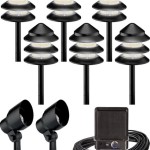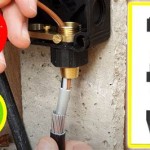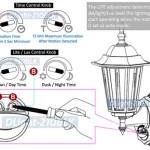Outdoor Lamp Post Bulbs Keep Blowing Fuses: Troubleshooting Guide
Outdoor lamp posts provide essential illumination for safety and aesthetics, but encountering frequent blown fuses can be frustrating. If your outdoor lamp post bulbs keep blowing fuses, it's important to diagnose the underlying cause to prevent further damage and ensure proper operation. This guide will explore common reasons behind this issue and provide practical steps to troubleshoot and resolve it.
1. Faulty Bulb
The most common culprit behind blown fuses is a faulty bulb. When a bulb malfunctions, it can draw excessive current, leading to an overload that trips the fuse. To determine if the bulb is the issue, try the following:
- Inspect the bulb: Look for signs of damage, such as cracks, broken filaments, or discoloration. A visibly damaged bulb is likely faulty.
- Replace the bulb: If the bulb appears intact, try replacing it with a new one of the same wattage and type. If the new bulb works without blowing the fuse, the original bulb was indeed the problem.
- Check the wattage: Ensure the new bulb's wattage matches the lamp post's specifications. Using a bulb with a higher wattage than recommended can overload the circuit and cause the fuse to blow.
2. Electrical Short Circuit
A short circuit occurs when electricity takes an unintended path, bypassing the intended circuit. This can occur due to damaged wiring, loose connections, or moisture intrusion. To investigate a potential short circuit:
- Inspect the wiring: Examine the wires leading to the lamp post for signs of fraying, exposed wires, or corrosion. If any damage is present, it must be repaired or replaced.
- Check the connections: Ensure all connections are tight and free from corrosion. Any loose connections should be tightened to prevent them from overheating and causing a short circuit.
- Look for moisture intrusion: Moisture can cause corrosion and create paths for electricity to flow, leading to a short circuit. Inspect the wiring for any signs of moisture and take steps to prevent future intrusion, such as sealing the connections or ensuring proper drainage around the lamp post.
3. Overloaded Circuit
An overloaded circuit occurs when too many electrical devices are connected to the same circuit, drawing more current than the circuit can handle. This often happens with older wiring that may have been installed for fewer appliances. To identify an overloaded circuit:
- Check the circuit breaker: Determine which circuit breaker controls the lamp post. If the breaker is constantly tripping, it indicates an overloaded circuit.
- Reduce the load: If the circuit is overloaded, consider reducing the number of devices connected to it. Alternatively, consult an electrician to install a dedicated circuit for the lamp post.
- Upgrade the wiring: If the wiring is outdated and cannot handle the current load, consider upgrading it to heavier gauge wires. This will prevent the circuit from overloading and ensure safe operation.
4. Environmental Factors
Environmental factors can also contribute to blown fuses. Extreme temperatures, moisture, and insects can damage wiring or components and lead to electrical malfunctions. To address environmental factors:
- Protect from extreme temperatures: If the lamp post is exposed to extreme temperatures, consider using heat-resistant insulation or components to prevent damage. Ensure adequate ventilation to prevent overheating.
- Prevent moisture intrusion: Seal any openings in the lamp post to prevent moisture from entering and causing corrosion. Install a weatherproof cover to protect the electrical components.
- Control insect infestations: Inspect the wiring for signs of insect infestation. If insects have damaged the wiring, it must be repaired or replaced. Consider using insect repellents or screens to prevent future infestations.
Troubleshooting blown fuses in outdoor lamp posts requires a systematic approach. By understanding the common causes, inspecting the components, and addressing potential issues, you can diagnose and resolve the problem effectively. If you're unsure about any aspect of the troubleshooting process, it's always best to consult a qualified electrician to ensure safety and proper repair.
Wondering Why Your Bulbs Keep Blowing Out Here S The Answer
.webp?strip=all)
My Lights Fuse Bulb Keeps Blowing Mr Electric

Why Do My Lights Keep Blowing A Fuse Abc Blog

Why Do My Light Globes Keep Blowing

Tips For Protecting Outdoor Light Strings Part 1 1000bulbs Blog
My Bulb In The House Is Always Blowing What Should I Do Quora

How To Fix Lights

How To Test Fix And Change Lights Diy Family Handyman

Harbor Breeze 24 Ft Plug In White Outdoor String Light With 12 Led Edison Bulbs The Lights Department At Com

Harbor Breeze 96 Ft Plug In Black Indoor Outdoor String Light With 36 White Led Edison Bulbs The Lights Department At Com
Related Posts







